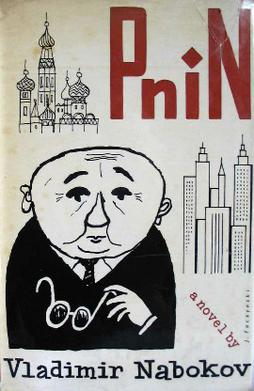Related Research Articles

Pnin is Vladimir Nabokov's 13th novel and his fourth written in English; it was published in 1957. The success of Pnin in the United States launched Nabokov's career into literary prominence. Its eponymous protagonist, Timofey Pavlovich Pnin, is a Russian-born assistant professor in his 50s living in the United States, whose character is believed to be based partially on the life of both Nabokov's colleague Marc Szeftel as well as on Nabokov himself. Exiled by the Russian Revolution and what he calls the "Hitler war", Pnin teaches Russian at the fictional Waindell College, loosely inspired by Cornell University and Wellesley College—places where Nabokov himself taught.

Ivan Petrovich Pnin was a Russian poet and political writer. In accordance with a Russian Illegitimacy custom, Pnin's surname was the abbreviation of that of his father, Prince Nicholas Repnin.
Kovalevsky is a Russian surname. Notable people with the surname include:
Kovalyov, often written as Kovalev, or its feminine variant Kovalyova, Kovaleva (Ковалёва), is a common Russian surname, an equivalent of the English surname Smithson. Due to the ambiguous status of the Cyrillic letter yo, the surname may be written with the Cyrillic letter ye instead, though literate Russian speakers always pronounce it yo.
Pavlyuchenko, Pavliuchenko, Pauliuchenka or Paŭliučenka, is a surname. Notable people with the surname include:
Volchok is a Russian surname. Notable people with the surname include:
Kovalenko is a very common Ukrainian surname.
Pavlichenko, Paulichenka or Paŭličenka is a Ukrainian surname. Notable people with the surname include:
Kovalevich is a Slavic surname used in Russian and Ukrainian, Belarusian, and Polish cultures.
Volchek is a Russian and Belarusian surname. Notable people with the surname include:
Volchkov, feminine: Volchkova is a Russian surname. The origin comes from "волк", wolf. A transliteration variant is Voltchkov.
Sapozhnikov or Sapozhnikova is a Russian surname, derived from the Russian word "сапожник" (cobbler/shoemaker/bootmaker). Notable people with the surname include:
Belenky, feminine: Belenkaya is a Russian surname, typically of people of Jewish origin. In 1972 it was the 14th most common Jewish surname in Moscow and the 16th in Leningrad.
Portnyagin is a Russian masculine surname derived from the occupation of portnyaga, portnoy, meaning tailor. Its feminine counterpart is Portnyagina. The surname may refer to
Pavlukhin is a Russian masculine surname, its feminine counterpart is Pavlukhina. Notable people with the surname include:

Volkovich is a Russian-language surname of Ruthenian origin, also adopted by Ashkenazi Jews. The Polonized form is Wolkowicz, Ukrainian: Vovkovych. Modern Belarusian: Vawkovich/Vaukovich, transliterated from Russian: Valkovich. Notable people with the surname include:
Petrushin (masculine), Petrushina (feminine) is a Russian-language surname. Notable people with the surname include:
Petrovsky (masculine) and its feminine form Petrovskaya are Russian-language surnames. People with the surname include:
Pavliuchenkov is a surname. Notable people with the surname include:
Pavlovsky is a Russian-language surname. The Ukrainian-language variant is Павловський, Pavlovskiy. Notable people with the surname include:
References
- ↑ Boris Unbegaun, Russian surnames, — Oxford: Clarendon Press, 1972; Russian version: Русские фамилии, 1989, Chapter IX: "Artificial surnames"